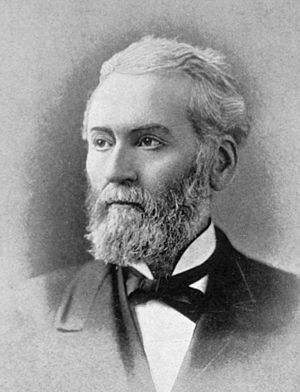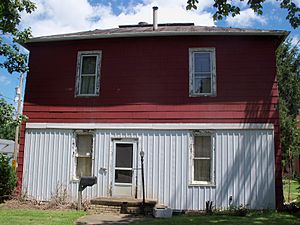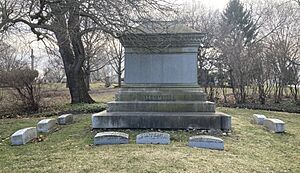Joseph Medill facts for kids
Quick facts for kids
Joseph Medill
|
|
|---|---|
 |
|
| 26th Mayor of Chicago | |
| In office 1871–1873 |
|
| Preceded by | Roswell B. Mason |
| Succeeded by | (Lester L. Bond), Harvey Doolittle Colvin |
| Personal details | |
| Born | April 6, 1823 Saint John, New Brunswick, British North America |
| Died | March 16, 1899 (aged 75) San Antonio, Texas |
| Resting place | Graceland Cemetery |
| Political party | Free Soil, Whig, Republican |
| Spouse | Katherine "Kitty" Patrick |
| Children | 3 |
| Residences | Wheaton, Illinois |
| Signature | |
Joseph Medill (born April 6, 1823 – died March 16, 1899) was an important figure in American newspapers and politics. He was born in Canada but became an American citizen.
Medill was a co-owner and managing editor of the Chicago Tribune, a very famous newspaper. He also served as the Mayor of Chicago from 1871 to 1873. This was right after the terrible Great Chicago Fire of 1871.
Contents
Early Life and Family
Joseph Medill was born on April 6, 1823, in Saint John, New Brunswick, which was part of British North America at the time. His family was of Scots-Irish background.
He studied law in Ohio and became a lawyer in 1846. On September 2, 1852, Medill married Katherine "Kitty" Patrick. They had three daughters named Katherine, Elinor, and Josephine.

Building a Newspaper Empire
Joseph Medill had a long and successful career in the newspaper business. In 1850, he bought a newspaper called the Coshocton Democratic Whig. He then changed its name to the Democratic Whig.
In 1853, Medill started a new newspaper in Cleveland, Ohio, with Edwin Cowles. It was called the Leader. Later, this paper became part of The Plain Dealer.
Joining the Chicago Tribune
The Chicago Tribune was a growing newspaper. In 1854, one of its owners, Captain J. D. Webster, asked Medill to become the managing editor. Other important people, like Dr. Charles H. Ray and editor Horace Greeley, also encouraged him to come to Chicago.
In 1855, Medill sold his share in the Leader newspaper. He then bought a part of the Tribune with Dr. Ray and Alfred Cowles, Sr..
Leading the Tribune
Under Medill's leadership, the Tribune became one of the biggest newspapers in Chicago. He was its managing editor until 1864. At that time, Horace White took over as editor-in-chief. Medill then focused more on political activities.
However, Medill and White disagreed about the presidential election of 1872. So, in 1873, Medill bought more shares from Cowles and White. This made him the main owner of the Tribune. In 1874, he became the editor-in-chief again, and he held this position until he passed away.
Political Involvement
The Tribune became a very important newspaper for the Republican Party in Chicago under Medill. He was strongly against slavery. He supported the Free-Soil movement and Abolitionism, which aimed to end slavery.
Medill was a big supporter of Abraham Lincoln in the 1850s. The Tribune played a key role in helping Lincoln get nominated for president. The newspaper also strongly supported the Union during the American Civil War. The Chicago Times was the Tribune's main rival during this time, supporting the Democrats.
In 1864, Medill left his daily work at the Tribune to focus on politics for about ten years. President Grant appointed him to the first Civil Service Commission. In 1870, he was chosen as a delegate for the Illinois Constitutional convention.
Becoming Mayor of Chicago
In 1871, after the devastating Great Chicago Fire, Joseph Medill was elected mayor of Chicago. He ran as a candidate for the "Fireproof" party, which was a temporary group formed after the fire. He served as mayor for two years.
Medill officially became mayor on December 4, 1871.
Mayor's New Powers
As mayor, Medill worked to give the mayor's office more power. He also helped create Chicago's first public library. He enforced blue laws, which are laws that restrict certain activities on Sundays. He also made important changes to the police and fire departments.
Medill successfully lobbied the Illinois General Assembly to change the city's rules. This change gave the mayor more authority. For example, the mayor could now:
- Lead the Chicago City Council meetings.
- Appoint city officials with the council's approval.
- Remove city officials, explaining the reasons to the council.
- Choose the leaders of City Council committees.
- Stop any new city law (ordinance) with a veto. The City Council would need a two-thirds vote to overrule his veto.
- Use special police powers.
In his first year as mayor, Medill faced little opposition from the City Council. He vetoed eleven ordinances, mostly related to wasteful spending. None of his vetoes were overturned. He used his new powers to appoint members to the new Chicago Board of Education and the commissioners for the public library. The City Council approved all his choices.
Rebuilding Chicago
Medill worked hard to get money to rebuild Chicago after the fire. He used his connections with state lawmakers in Springfield, Illinois, to get financial help from the state. Even though state law usually prevented direct money to cities, Medill got a special law passed. This law reimbursed Chicago for $2.9 million it had spent on the state-owned Illinois and Michigan Canal.
Medill also sought financial help from the federal government. He used his connections in Washington, D.C. to ask for aid. He wrote to Vice President Schuyler Colfax to ask for a tariff rebate. This would make building materials cheaper for the city's reconstruction. Despite strong opposition, the law passed. Medill even convinced President Grant to donate $1,000 to help the city. More than $5 million in gifts and loans were collected from people and cities worldwide.
Following Medill's lead, the City Council approved a rule on February 12, 1872. This rule stopped the construction of wood frame buildings within city limits. This was to prevent future fires from spreading so quickly.
Challenges as Mayor
In his second year as mayor, Medill began to use his new powers more often. This caused some tension. He appointed his loyal supporters to lead most of the important council committees. Aldermen from areas with many immigrant residents received less consideration for appointments. In the first three months of 1873 alone, Medill vetoed five City Council ordinances.
Medill and his police superintendent, Elmer Washburn, also cracked down on gambling in the city.
Medill faced resistance not only from the City Council but also from citizens. Some people, like Anton C. Hesing, even called him "Joseph I, Dictator" because of his strong leadership.
The stress of being mayor affected Medill's health. In August 1873, he appointed Lester L. Bond as Acting Mayor for the rest of his term. Medill then traveled to Europe to recover.
Later Life and Legacy
Joseph Medill passed away on March 16, 1899, in San Antonio, Texas, at the age of 75. He was buried at Graceland Cemetery in Chicago.
Medill's legacy lives on in several ways. During World War II, a ship called the SS Joseph M. Medill was built in his honor.
The Medill School of Journalism, Media, and Integrated Marketing Communications at Northwestern University is also named after him. This school trains future journalists and media professionals.
Family Tree
|
||||||||||||||||||||||||||||||||||||||||||||||||||||||||||||||||||||||||||||||||||||||||||||||||||||||||||||||||||||||||||||||||||||||||||||||||||||||||||||||||||||||||||||||||||||||||||||||||||||||||||||||||||||||||||||||||||||||||||||||||||||||||||||||||||||||||||||||||||||||||||||||||||||||||||||||||||||||||||||||||||||||||||||||||||||||||||||||||||||||||||||||||||||||||||||||||||||||||||||||||||||||||||||||||||||||||||||||||||||||||||||||||||||||||||||||||||||||||||||||||||||||||||||||||||||||||||
| Notes: | ||||||||||||||||||||||||||||||||||||||||||||||||||||||||||||||||||||||||||||||||||||||||||||||||||||||||||||||||||||||||||||||||||||||||||||||||||||||||||||||||||||||||||||||||||||||||||||||||||||||||||||||||||||||||||||||||||||||||||||||||||||||||||||||||||||||||||||||||||||||||||||||||||||||||||||||||||||||||||||||||||||||||||||||||||||||||||||||||||||||||||||||||||||||||||||||||||||||||||||||||||||||||||||||||||||||||||||||||||||||||||||||||||||||||||||||||||||||||||||||||||||||||||||||||||||||||||
This family tree does not show Medill's third daughter, Josephine, who died in 1892.
 | Sharif Bey |
 | Hale Woodruff |
 | Richmond Barthé |
 | Purvis Young |


